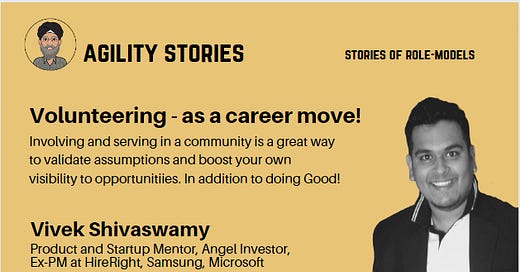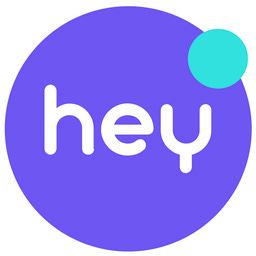This is my story of how we built a community to learn Product Management by doing. The story sits on volunteering.
I was a product manager at Samsung. While at Samsung, I led the India teams’ IoT Standards strategy for smart homes. I was actively involved with the Open Connectivity Foundation to evangelise IoT standards and facilitate its open-source implementation.
Community is a two-way street. You add value to others. You also pick up insights that enable your day job. The simple entry ticket for anyone is - active involvement.
Just before Covid struck, I moved to HireRight, a SaaS platform for pre-employment screening and onboarding.
Over the years, I had built a preference for engaging the community to accomplish bigger things. So, I wanted to continue to volunteer.
For tech jobs in the startup and product driven ecosystems, a product manager role is a lynchpin for the tech team.
I decided to give back to the community on LinkedIn with what I had learnt as a product manager, in the previous 5 years, to enable youngsters to transition into this role.
All this was not a very thought out grand plan :).
Come Covid, everyone had lots of idle time on their hands, while locked in.
I started following product management experts on LinkedIn. Up to now, my worldview was based on the products I had worked on myself. That is probably true for most of us anyways.
I discovered Product School (productschool.com) - a global product community with 100,000+ members on Slack. Up to now, I had only used Slack for work. I now realised there was so much happening which I was not aware of.
They created a lot of content around product management. They offered weekly sessions. I started attending. All this was at a global level.
While the outside world was in lockdown - my eyes opened to product management in different facets, industries and perspectives. It was a treat to listen to the views of senior product experts after office hours.
Volunteering in these communities was the next natural step. I reached back whenever someone was ‘looking for volunteers’.
I did not restrict myself to product management expertise. I helped to organise events, manage logistics, run hackathons, and conduct product challenges. Many were things I had not done before. Some were things that would be trivial for my day job.
When I look back today, volunteering was one of the smartest things I did.
Mind the Product (mindtheproduct.com) and Product Buds (productbuds.co) were other communities I got involved in. My discoverability also slowly started increasing.
Product Buds was newer. They asked me to come in as a guest speaker and talk about my journey as a PM. So I did.
Many attendees reached back with feedback that it was super useful because it went beyond bookish knowledge.
This gave me the boost to reach out and help more folks. I offered free mentorship sessions over weekends. They lapped it up. I was booked for 2 months.
30-35 conversations later, I realised there is a huge gap in how people are preparing for the PM profession. No one focuses on practical hands-on learning.
I started to interview product leaders and create community content via blogs and podcasts to encourage this.
I met Abhilash and Prateek on LinkedIn who were trying similar things. We met and discussed it together.
We decided to join hands. Join hands to promote hands-on learning! That is how HeyPM got started (see
https://heypm.co
)
We also created a repository of resources for aspiring PMs (
)
Our first cohort just had 5 teams (testing our MVP). Each team comprised of 2 aspiring PMs, 4 developers and 1 designer. The team had access to a senior PM as a mentor.
The teams were assigned a problem statement on Day 1. At the end of 6 weeks, they had to be ready with a working prototype.
On Demo day - we called in product leaders to evaluate and give feedback.
This was the basic structure of a bootcamp. It was a huge success.
We made tweaks as we went along. Instead of hypothetical problems, we tried to bring in real-life problems.
We began to find mentors easily because we let mentors get closely involved. Some even hired their mentees later.
All this worked because this was a win-win for all the stakeholders involved.
We have done 3 cohorts up to now. Every cohort is a lot of work for volunteer teams, so we are still exploring how it can be scaled and can use all the help we can get.
I intend to continue doing this and help friends trying to break into product management by closing the gap between theoretical education and practical jobs.
I have a question to ask before I go.
On one hand is the current state of engineering college education. Especially in Tier 2 and 3. What you basically get is a degree and maybe a motivation to prepare for Civil Service.
On the other side are thriving communities - ours is just an example - where people quickly make up for years lost in college and find dream opportunities in the global pond.
What will it take to create many thriving communities across today's Engineering Colleges? :)





